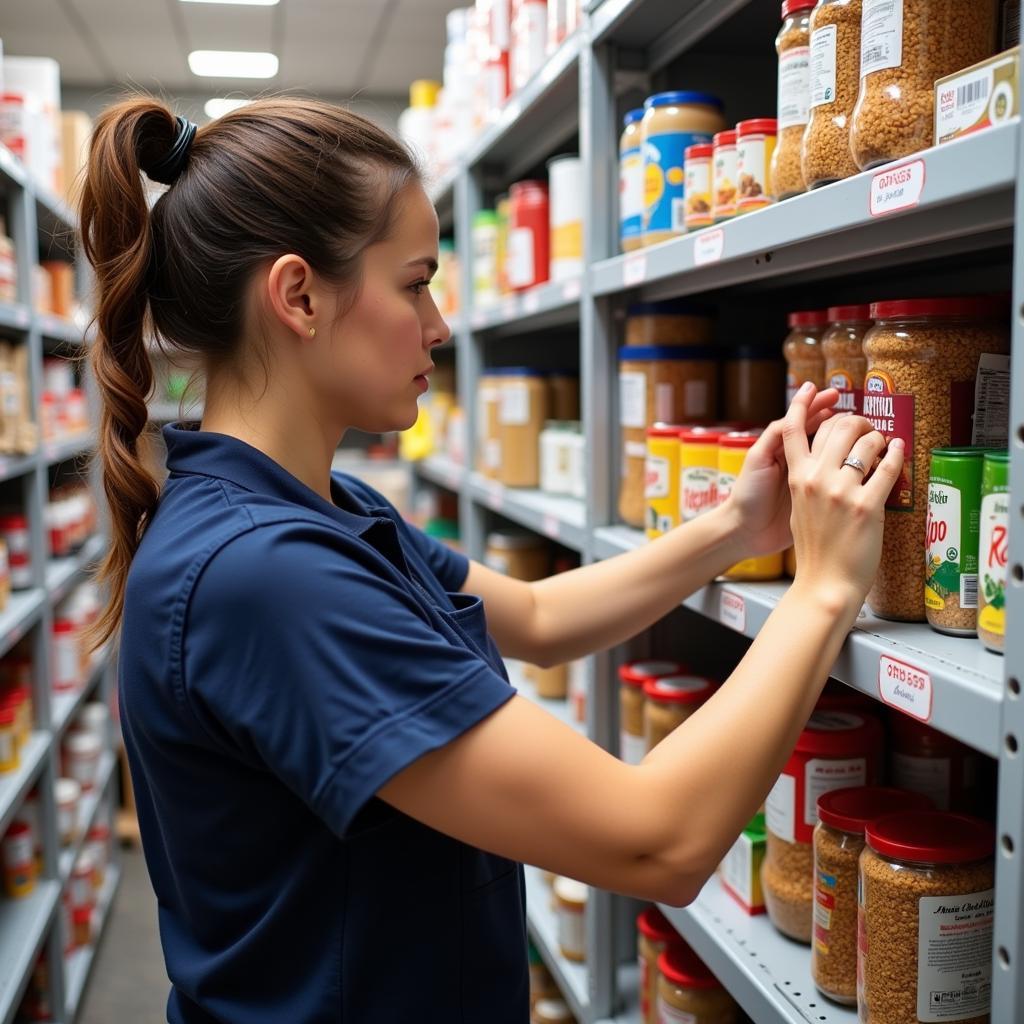A Food Pantry Job Description outlines the key responsibilities, skills, and qualifications needed for various roles within these vital community organizations. From managing inventory to interacting with clients, these positions offer a unique opportunity to make a tangible difference in the lives of those facing food insecurity. Let’s delve deeper into what it takes to work at a food pantry.
Working at a food pantry can be a truly rewarding experience. It offers the chance to directly impact the lives of individuals and families within your community. Check out resources like a resume for food delivery driver for related opportunities.
Understanding the Core Responsibilities
A food pantry relies on a dedicated team to fulfill its mission. While specific duties may vary based on the size and structure of the organization, some core responsibilities are common across most food pantry jobs. These include:
- Client Interaction: This often involves interviewing clients to assess their needs, providing information about available resources, and ensuring a respectful and empathetic environment.
- Food Distribution: Tasks range from stocking shelves and organizing inventory to preparing food packages and assisting clients with their selections. Efficiency and attention to detail are crucial in this aspect.
- Inventory Management: Maintaining accurate records of food donations, purchases, and distribution is essential for effective operations. This involves tracking expiration dates, rotating stock, and ordering necessary supplies.
- Community Outreach: Some roles may involve connecting with local businesses, community groups, and individuals to solicit food donations, volunteer support, or financial contributions.
- Administrative Tasks: Depending on the position, administrative duties might include answering phones, scheduling appointments, managing databases, and preparing reports.
Looking for leadership roles in the food service industry? A food service director resume might be a good resource.
Different Roles Within a Food Pantry
Food pantries often have a diverse range of positions, each contributing to the overall success of the organization. Here’s a look at some common roles and their typical responsibilities:
Pantry Manager
The Pantry Manager oversees the day-to-day operations, ensuring smooth and efficient functioning. This includes managing staff and volunteers, coordinating food distribution, maintaining inventory, and developing community partnerships.
Client Services Coordinator
This role focuses on providing direct support to clients, assessing their needs, connecting them with relevant resources, and ensuring a positive and welcoming experience.
Inventory Specialist
Responsible for maintaining accurate inventory records, ordering supplies, managing stock rotation, and ensuring food safety protocols are followed.
Volunteer Coordinator
This position involves recruiting, training, and managing volunteers, matching their skills with the needs of the pantry, and fostering a positive volunteer experience.
Outreach Coordinator
The Outreach Coordinator focuses on building relationships with the community, securing food and financial donations, and raising awareness about the pantry’s mission and services.
If you’re in Virginia, Minnesota and looking for food assistance, you might want to check out a food shelf virginia mn.
 Food Pantry Inventory Management
Food Pantry Inventory Management
Essential Skills and Qualifications
While specific qualifications may vary depending on the role, certain skills are highly valued across most food pantry jobs. These include:
- Strong Communication Skills: Effective communication is crucial for interacting with clients, volunteers, and community partners.
- Organizational Skills: Maintaining an organized and efficient pantry requires strong organizational and time management skills.
- Interpersonal Skills: The ability to build rapport and empathize with clients is essential for creating a supportive environment.
- Problem-Solving Skills: Food pantries often face unexpected challenges, requiring staff to think creatively and find solutions.
- Computer Literacy: Familiarity with basic computer programs and databases is often necessary for managing inventory and client information.
Preparing for emergencies is crucial, and resources like a patriot foods 3-month supply can offer peace of mind.
 Food Pantry Client Interaction
Food Pantry Client Interaction
Conclusion
A food pantry job offers a unique opportunity to contribute to your community and make a real difference in the lives of those facing food insecurity. By understanding the various roles, responsibilities, and required skills, you can determine if a career in this fulfilling field is the right fit for you. If you are looking for food assistance in Kentucky, a food pantry frankfort ky might be helpful.
FAQ
- What are the typical hours for food pantry jobs? This varies depending on the pantry, but many operate during daytime hours and some evenings or weekends.
- Is prior experience required to work at a food pantry? Not always. Many pantries welcome volunteers and entry-level staff.
- What type of training is provided for food pantry staff? Training usually covers topics like food safety, client interaction, and inventory management.
- Are food pantry jobs paid or volunteer positions? Both. Many pantries have paid staff and rely heavily on volunteers.
- How can I find food pantry jobs in my area? Check online job boards, local community centers, and the websites of food banks.
- What are the benefits of working at a food pantry? Besides making a difference, benefits can include gaining valuable experience, developing new skills, and connecting with your community.
- What is the most rewarding aspect of working at a food pantry? Many find the direct impact on people’s lives to be the most rewarding aspect.
Scenarios
- Scenario 1: A client comes to the pantry and is overwhelmed by the choices. A staff member calmly guides them through the process, explaining the different options and helping them select items that meet their dietary needs.
- Scenario 2: A volunteer notices that the pantry is running low on a particular item. They inform the inventory specialist, who promptly orders more to ensure clients have access to the necessary food.
- Scenario 3: A client is struggling with transportation issues. The client services coordinator connects them with a local organization that provides transportation assistance.
Further Exploration
Explore our other articles on related topics such as food bank volunteer opportunities and career paths in non-profit organizations.
Contact us for support: Phone: 02437655121, Email: minacones@gmail.com Or visit us at: 3PGH+8R9, ĐT70A, thôn Trung, Bắc Từ Liêm, Hà Nội, Việt Nam. We have a 24/7 customer service team.